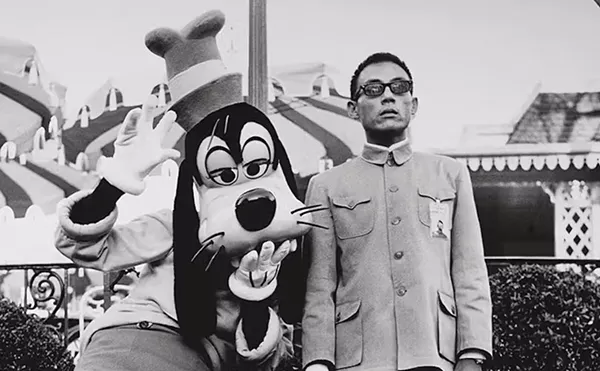A.R. Gurney's Sylvia is something of a shaggy-dog story. Once the punch line is trotted out and has been riffed on a couple of times, the play goes no place at all. Gurney, better known for sophisticated, angst-driven observations of the uptown set (The Dining Room, The Cocktail Hour), has traded in his usual insights for a pile of dumb dog jokes. The result, like an overlong game of catch, wears thin pretty quickly. In its Actors Theatre of Phoenix production, awkward acting and inept direction don't help any.
Sylvia, which premiered at the Manhattan Theatre Club in 1995, is based in part on Gurney's relationship with his own dog, whom his wife reportedly loathes. In the play, Sylvia (Christie Klein) is a half-poodle, half-Labrador, all-talking-singing-dancing stray who's chewing a hole in the 22-year marriage of her new owners, Greg (Jared Sakren) and Kate (Heidi Ewart). Greg is having a mid-life crisis, bored with his job and questioning his purpose in life; while Kate, who's just sent her kids off to college, is on a fast-paced career track. Enter Sylvia, who gives Greg something to focus on, who squares off with Kate, and who drags in a lot of goofy one-liners aimed at dog lovers. All of this is meant to be howlingly funny, but Gurney's script too often relies on situational humor (what would a dog say if . . .?) and poop jokes for laughs.
Still, some of this stuff is actually amusing. Sylvia, who first appears wearing torn, filthy fatigues, returns later from the groomer in a little black skirt and shiny hair bows, performing a bump-and-grind disco routine. In one scene, she reveals what a dog is saying when it barks at a cat ("Fuck you! I'm going to tear off your tail and shove it up your ass!"); in another, she stops to sniff a lamppost with the aside, "Excuse me, I have to check my messages." And in the play's most entertaining segment, Greg accompanies Kate to the airport to see her off, while Sylvia, on the other side of the stage, wanders around the apartment singing Cole Porter's "Ev'ry Time We Say Goodbye (I Die a Little)."
But these highlights are separated by long speeches about life and love, all of them peppered with dumb dog jokes and silly situations meant to tug at the heartstrings of pet owners. These are all spouted by the people in the story, but the most engaging character in the play is the dog. Unfortunately, the play isn't about her, and when Sylvia is offstage, the story meanders and finally, like a naughty pooch, soils itself.
There is some interesting subtext, most of it dealing with sexism: When Sylvia begins to pay more attention to stray dogs than she does to Greg, he has her spayed; when he's describing Kate's new interest in her career, he refers to it as "a phase women are going through these days." Literature fans will enjoy cloaked references to Dorothy Parker, James Joyce and Edith Wharton, though not one of these allusions garnered a laugh on opening night.
The actors were more warmly received, though I can't imagine why. I've seen Ewart play everything from giants to children, and she's always fresh and likable. But Ewart's performance in Sylvia is just plain baffling. She shouts every one of her lines and plays Kate so broadly that, when she begins spouting Shakespeare in many of her later scenes, it doesn't seem all that peculiar, which is what Gurney wants us to believe. Ewart's Kate is such a chilly, unyielding harpy that one can't imagine that any man would be willing to give up his dog--or even an hour of his time--for her. She looks wonderful, with a different glamorous outfit and hairstyle in every scene, but each time she clomped onto the stage and began barking, I wanted to crawl under my seat.
Unfortunately, director Beverly Smith-Dawson seems to have asked the rest of her cast to keep pace with Ewart. Sakren's performance is equally loud and flat; he spends much of his time onstage either trying to out-shout Ewart or being upstaged by Klein, who turns in a spirited, sweet-tempered performance.
That's no mean feat when you consider what she's up against. Surrounded by a pair of screeching actors and Richard Trujillo--who plays three ensemble characters, each more annoying than the last--Klein's portrayal of a talking dog could easily have been swallowed whole. Instead, it's the only thing up on the stage (other than Jeff Thomson's masterfully designed set) worth looking at. Smith-Dawson seems to have poured all her efforts into guiding Klein, who's never down on all fours. She eschews flea-scratching and panting for more subtle tricks: pulling fast-as-lightning facial expressions, shadowing other actors around the stage, or tumbling gracelessly onto the stage when she's told to "sit."
One good performance does not an evening of theater make. I attended the show's first Friday-night performance, an exception made by the company, which usually requests that critics come on Saturday. I was informed that the difference between these two performances "is like night and day," but I doubt that by the following night Ewart had stopped bellowing or that Trujillo had stopped indicating and started acting.
In any case, the problem with Sylvia is not confined to mediocre acting or the limitations of Gurney's story. It's that none of this flea-bitten nonsense adds up to much in the end. Considering the playwright's past successes, sitting through his two-hour dog show is especially disappointing--like having your leg humped when you were hoping to get laid.











